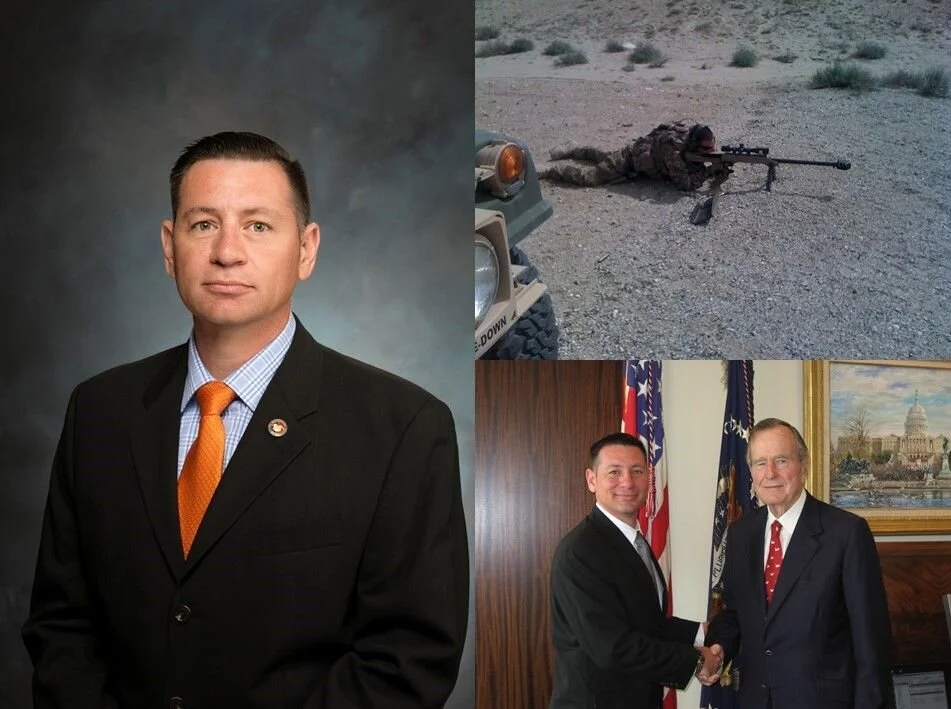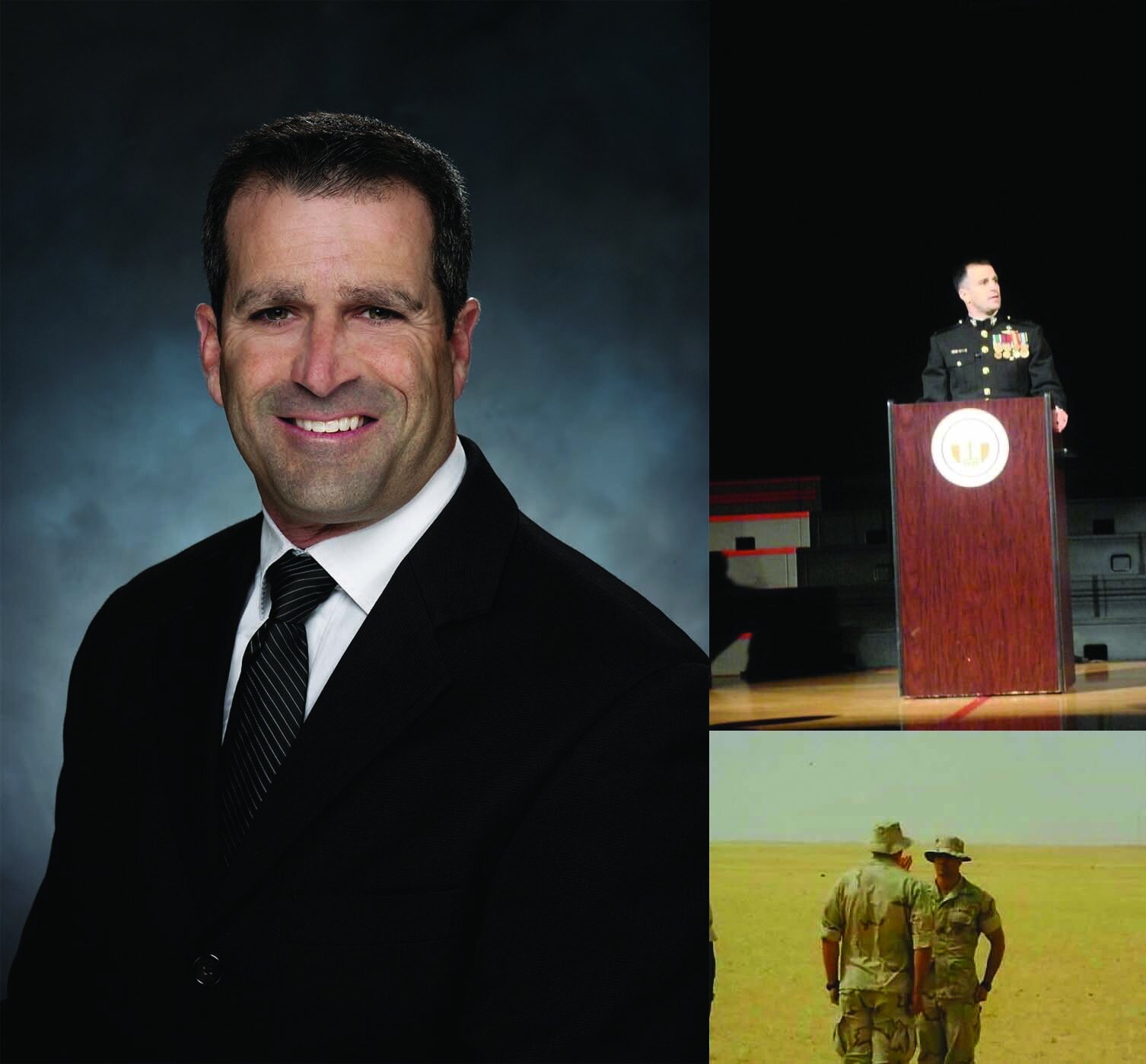VETS SPOTLIGHT
THE VETERAN/MILITARY OUTREACH STRATEGIC PROGRAM IS PARTNERING WITH TID TO REDESIGN THE LLNL’S VETERANS CAREERS WEBSITE, AND WE WOULD LIKE TO INCLUDE TESTIMONIALS FROM CURRENT LAB EMPLOYEES WHO ARE VETERANS AND/OR CURRENTLY SERVING IN THE MILITARY RESERVES OR NATIONAL GUARD. THE INFORMATION PROVIDED WOULD BE USED TO HIGHLIGHT OUR VETS MEMBERS ON THE VETS SOCIAL MEDIA PAGES, THE VETS EXTERNAL WEBSITE AND SHARED WITH THE VETERAN/MILITARY OUTREACH STRATEGIC PROGRAM.
WE WOULD REALLY APPRECIATE IT IF YOU COULD TAKE A FEW MOMENTS TO GIVE US YOUR INPUT ON HOW YOU FEEL ABOUT WORKING AT LLNL BY COMPLETING THE INFORMATION BELOW. YOUR INPUT AND FEEDBACK WILL GREATLY ENHANCE OUR ABILITY TO CONTINUE TO EMPLOY OUR VETERANS AFTER THEY FINISH THEIR MILITARY SERVICE.
IF POSSIBLE, PLEASE ATTACH A MILITARY PHOTO AND A LAB/PROFESSIONAL PHOTO SO THAT WE MAY HIGHLIGHT YOUR SERVICE TO OUR COUNTRY AND TO OUR DOE/NNSA CRITICAL MISSIONS. (JUST CLICK THE “UPLOAD” BUTTON AT THE BOTTOM, NEXT TO “PHOTOS”).
Name: Adam Morgan
Directorate: WCI
Job Title: Information System Security Officer
Years at the Lab: 1
Military Branch of Service and Rank (Last Position held with the military, or current position if you are in the Guard or Reserves): CA ARNG - Sergeant (E-5)
How has the skills and education you gained in your military career, helped you in your transition to your current role at the lab?: The CAARNG helped give me the time to develop a baseline of IT related knowledge and coding skills. My analyst experience at USCYBERCOM helped me further develop that knowledge. My transition to the lab as a full-time employee was quick and painless. The skills that I have continued to develop here will only help me to progress along my future career path.
What do you like most about working at LLNL?: - Continuous professional development. I have the opportunity to learn and apply what I learn on a daily basis. I am thankful every day for this opportunity.
- People. Daily interactions with people who care and are committed to the mission. If I need help, I can ask. If someone needs help, I give it. It is the culture here that makes my days easy.
If you were to recommend LLNL to another Vet, what would you say?: Your worst day here will be better than most of your best in the DoD. I actively seek out friends from my old units. People I know and trust to refer them here. The lab has offered more possibilities to both myself and my family than the DoD did for 8 years.
#VETSSPOTLIGHT
Name: Steven Conn
Directorate: DO
Job Title: Program Security Representative / Officer, SDO, TSCMC
Years at the Lab: 35+
Military Branch of Service and Rank (Last Position held with the military, or current position if you are in the Guard or Reserves): Army, E-4
How has the skills and education you gained in your military career, helped you in your transition to your current role at the lab?: As a soldier you learn a lot of basic skills that I found very useful with my first job at LLNL; a Security Police Officer (SPO).
I studied Law Enforcement (Correspondence courses) both overseas and stateside while serving my country that were also very useful while being a SPO.
What do you like most about working at LLNL?: The opportunities to work with personnel in the field such as NNSS (NV), Los Alamos (LANL), New Mexico, and other venues.
Traveling to and from NNSA sites has been very rewarding and most certainly the highlight of my career.
If you were to recommend LLNL to another Vet, what would you say?: The Laboratory is full of diversity and opportunity. It's definitely a great place to work and further your education too.
Name: Brian Cracchiola
Directorate: Weapons and Complex Integration (WCI), Operations
Job Title: WCI Explosives Operations Manager
Years at the Lab: 22
Military Branch of Service and Rank (Last Position held with the military, or current position if you are in the Guard or Reserves): Active Army & Army Reserve, current MAJ/O-4 (P) Nuclear Targeting Analyst with U.S. INDOPACOM
How has the skills and education you gained in your military career, helped you in your transition to your current role at the lab?: Having served as an Enlisted Soldier, Noncommissioned Officer, and now a Commissioned Officer, there are very few skills or experiences that have not been useful in my career at LLNL. Daily I utilize military learned skills, everything from work ethic instilled during Basic Training, to problem-solving skills honed in combat as a NCO, to being able to see things from a strategic framework and plan like an Officer. Veterans understand leadership, responsibility, and most importantly OWNERSHIP. If you are tasked with something you own it and are responsible for seeing it to completion; these are traits that employers value, especially LLNL. Transition is not easy, and patience is a virtue that many veterans need to learn. However, there is a strong veteran presence at LLNL and there is no shortage of former Service Members willing to assist in a mentoring role.
What do you like most about working at LLNL?: Much like the military, at LLNL the only thing holding one back or limiting someone's career is… themselves. LLNLs organizational leadership appreciate go-getters and accurately targeted motivation. LLNL demonstrates its commitment to its employees by offering education, experience, and increased responsibility to those willing to seek it out. At the end of the day, what we do matters!
As an Army Reservist, my LLNL leadership has always understood the value of my dual service. The intangibles that I bring back after each Annual Training, or after prolonged deployments OCONUS. Likewise, the Army benefits from my day-to-day exposure to cutting edge science, technology, and LLNL's approach to tackling problems. This symbiotic relationship makes it easier for me as a reservist and an employee. Making both my careers mutually beneficial has proven to put me in a position to help both organizations in ways many can’t.
If you were to recommend LLNL to another Vet, what would you say?: I routinely speak to Service members and stress how LLNL provides them with the opportunity to continue to serve the nation. As Veterans we bring a completely different suite of skills than the traditional employee fresh from their college or university. Experience is everything, you bring uncommon experience and insight. Who better to integrate into teams working on intricate National Security Missions, than you with your understanding having been the ‘pointy tip of the spear’. The Nation, the Services, most importantly our Brothers and Sisters in Arms depend on us to provide them with the tools to protect our way of life. At LLNL you can play a continuing role; off the battlefield but no less important.
Derek Laza
Directorate: Computing matrixed to WCI
Job Title: Senior Systems & Network Technologist (Windows Server Administrator)
Years at the Lab: 1
Military Branch of Service and Rank (Last Position held with the military, or current position if you are in the Guard or Reserves): Army Specialist (35T)
How has the skills and education you gained in your military career, helped you in your transition to your current role at the lab?: I had always played with computers, but I did not have any formal training until I joined the Army. I completed my AIT at Fort Huachuca and completed an Associates in Electronics Technology from Cochise College while I was there. It was great training and the knowledge and degree jumpstarted my career in IT. Working as a Windows Server Administrator, I use the skills I learned in the Army on a daily basis.
What do you like most about working at LLNL?: The lab is a great place to work. Great pay and benefits and I work with some amazing people doing amazing things. We have several very important missions and if you need a change of pace, it isn't unrealistic to support a different mission.
If you were to recommend LLNL to another Vet, what would you say?: I'd say they should come work here. I work with many Vets in my team. We are all still focused mission-first, the kinship of Veterans is strong, and we can have friendly banter when the Army/Navy game gets close. The people I work with have come from many disciplines in the military and we've all found a good home here at the Lawrence Livermore National Lab.
Shaun Stephenson
Directorate: SHRM
Job Title: Veteran/Military Strategic Program Manager Training and Qualification Functional Area Manager
Years at the Lab: 9
Military Branch of Service and Rank (Last Position held with the military, or current position if you are in the Guard or Reserves): USMC Captain Director Division Schools
How has the skills and education you gained in your military career, helped you in your transition to your current role at the lab?: My leadership skills, military education/instruction and global operating experience in the military provided a strong foundation allowing me to both transition successfully and find tremendous purpose in my tenure at LLNL.
What do you like most about working at LLNL?: What I like most about working at LLNL starts with the people who care deeply about our values, mission and vision. When the team is aligned in purpose there's strong synergy in solving some of the most difficult global problems. We often partner across multi-disciplinary teams creating authentic solutions through diversity in thought.
If you were to recommend LLNL to another Vet, what would you say?: You bring a unique perspective to our workforce that comes from solving problems in a fast paced, high stress, complex work environment. LLNL needs and thrives off of your experience and perspective and values your opinion. Making the transition is very realistic and often in areas less expected outside the traditional STEM fields. Come join an incredibly talented workforce that will enable you to work in an environment that allows you to continue to serve your Nation in numerous capacities.
Jessica Krueger
Directorate: Engineering
Job Title: Asset Manager
Years at the Lab: 1
Military Branch of Service and Rank (Last Position held with the military, or current position if you are in the Guard or Reserves): Lieutenant, US Navy
How has the skills and education you gained in your military career, helped you in your transition to your current role at the lab?: Oddly, even as 'Navy nuke' with a Nuclear Engineering degree , I don't think I've used any of my education or specific 'military skills' in my current position working at the National Ignition Facility. I think the things that have helped me manage the transition and be successful here are the 'soft' skills we gain: good communication, bearing and tact; ability to cross-train and understand the "big picture"; and of course staying cool under pressure.
What do you like most about working at LLNL?: The people, the culture, and the mission. Some of my other recently separated friends have expressed that they miss the camaraderie at their previous units, and how easily and quickly we tend to make friends (with other military personnel) because of frequent PCS's; I'm lucky enough to say I've never had those feelings. My colleagues at LLNL are genuinely passionate about their work and very engaging to newcomers. I'm constantly challenged to learn and exercise new skills so there's never a dull moment - until the workday is over and we actually go home to pursue the "life balance" part of "work-life balance".
If you were to recommend LLNL to another Vet, what would you say?: You can adapt your military experience to succeed in many positions - choose something you're interested in and go for it! There are so many opportunities and once you gain some experience, if you'd like to seek out other opportunities within the lab, there's a process and a lot of support for that.






